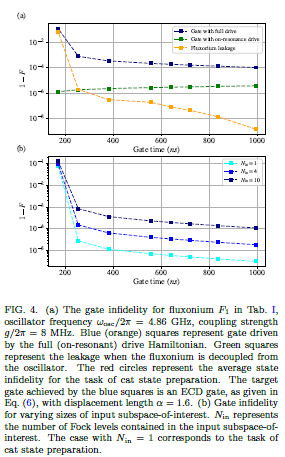Cross-resonance control of an oscillator with a fluxonium ancilla
2024-08-02 12:15
2526 浏览The conditional displacement (CD) gate between an oscillator and a discrete-variable ancilla plays a key role in quantum information processing tasks, such as enabling universal control of the oscillator and longitudinal readout of the qubit. However, the gate is unprotected against the propagation of ancilla decay errors and hence not fault-tolerant. Here, we propose a CD gate scheme with fluxonium as the ancilla, which has been experimentally demonstrated to have a large noise bias and millisecond-level lifetimes. The proposed gate is applied cross-resonantly by modulating the external flux of the fluxonium at the frequency of the target oscillator, which requires minimal hardware overhead and does not increase sensitivity to decoherence mechanisms like dephasing. We further provide a perturbative description of the gate mechanism and identify the error budget. Additionally, we develop an approximate procedure for choosing device and gate parameters that optimizes gate performance. Following the procedure for multiple sets of fluxonium parameters from the literature, we numerically demonstrate CD gates with unitary fidelity exceeding 99.9% and gate times of hundreds of nanoseconds.


Article:https://arxiv.org/abs/2407.18351
